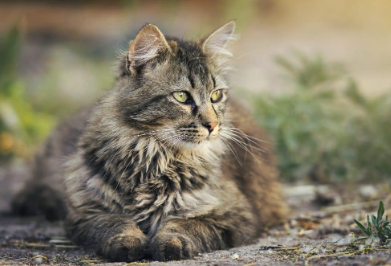Choosing the perfect name for your feline friend is an essential part of welcoming a new pet into your home. While many cat owners opt for traditional human names, there is a growing trend towards selecting unique and imaginative non-human names. These names not only reflect the individuality of your pet but also add a touch of creativity and fun. This article delves into the fascinating world of non-human cat names, providing you with an exhaustive list of options, the significance behind these names, and tips on how to choose the perfect name for your furry companion.

The Appeal of Non-Human Cat Names
Non-human cat names are appealing for several reasons. They allow for greater creativity and personalization, making your cat’s name truly unique. Additionally, these names often reflect the owner’s interests, hobbies, and personality, creating a deeper bond between pet and owner. Non-human names can be inspired by various sources such as mythology, literature, pop culture, nature, and even food. The possibilities are endless, and the only limit is your imagination.
Categories of Non-Human Cat Names
Mythological Names
Mythology offers a treasure trove of names with rich histories and meanings. Whether you draw from Greek, Roman, Norse, Egyptian, or other mythologies, these names often carry a sense of grandeur and mystery. Examples include:
- Apollo: Greek god of music, arts, and prophecy.
- Bastet: Egyptian goddess of home, fertility, and cats.
- Loki: Norse god of mischief and trickery.
- Athena: Greek goddess of wisdom and warfare.
Literary Names
Books and literature provide an excellent source of inspiration for cat names. From classic novels to modern fantasy series, literary names can add a touch of sophistication or whimsy to your cat’s identity. Examples include:
- Gandalf: The wise wizard from J.R.R. Tolkien’s “The Lord of the Rings.”
- Hobbes: The philosophical tiger from “Calvin and Hobbes.”
- Cheshire: The grinning cat from “Alice in Wonderland” by Lewis Carroll.
- Poe: After Edgar Allan Poe, the master of gothic literature.
Pop Culture Names
Pop culture references are a fun and trendy way to name your cat. These names can come from movies, TV shows, music, and celebrities. Examples include:
- Yoda: The wise Jedi master from “Star Wars.”
- Stark: Inspired by Tony Stark (Iron Man) from Marvel Comics.
- Beyoncé: After the famous pop singer.
- Dobby: The loyal house-elf from the “Harry Potter” series.
Nature-Inspired Names
Nature is a beautiful source of inspiration for cat names. From plants and animals to celestial bodies and weather phenomena, nature-inspired names often evoke a sense of tranquility and wonder. Examples include:
- Luna: Meaning “moon” in Latin.
- Willow: A graceful and flexible tree.
- Orion: A prominent constellation.
- Storm: A powerful weather event.
Food and Drink Names
Food and drink names are quirky and endearing, often highlighting your favorite treats or beverages. These names can be sweet, savory, or even humorous. Examples include:
- Mocha: A coffee-chocolate flavor.
- Sushi: A popular Japanese dish.
- Peanut: A small and cute legume.
- Brie: A type of cheese.
How to Choose the Perfect Non-Human Cat Name
Choosing the perfect name for your cat involves considering various factors to ensure it suits their personality and your preferences. Here are some tips to help you make the best choice:
Reflect Your Cat’s Personality
Observe your cat’s behavior and characteristics. Are they playful and energetic, or calm and regal? A name that matches their personality will feel more fitting. For example, a mischievous cat might suit the name Loki, while a serene and graceful cat might be better named Willow.
Consider the Name’s Sound
The sound of the name is important as it will be used frequently. Names with clear, sharp sounds are often easier for cats to recognize. Avoid names that sound too similar to common commands like “sit” or “stay” to prevent confusion.
Think About the Length
Shorter names are generally easier to call out and for your cat to learn. However, if you prefer a longer name, consider if it can be shortened into a nickname. For example, Cheshire can be shortened to Chess.
Check for Uniqueness
Ensure the name you choose is unique and not too common among other pets in your area. This will help avoid confusion, especially in public places like parks or vet clinics.
Personal Significance
Choose a name that has personal significance to you. It could be related to your hobbies, favorite books, or even a place you love. This personal touch will make the name more special.
Popular Non-Human Cat Names
To give you more ideas, here is a table of popular non-human cat names categorized by their source of inspiration:
| Mythology | Literature | Pop Culture | Nature | Food & Drink |
|---|---|---|---|---|
| Apollo | Gandalf | Yoda | Luna | Mocha |
| Bastet | Hobbes | Stark | Willow | Sushi |
| Loki | Cheshire | Beyoncé | Orion | Peanut |
| Athena | Poe | Dobby | Storm | Brie |
The Benefits of Unique Cat Names
Unique non-human cat names offer several benefits that enhance the relationship between you and your pet. Here are some advantages:
Easy Identification
A unique name makes it easier to identify your cat in social situations, at the vet, or in public places. It helps avoid confusion with other pets that might have common names.
Conversation Starter
A distinctive name often sparks curiosity and conversation. People are likely to ask about the origin or meaning of your cat’s name, providing an opportunity to share interesting stories or facts.
Reflects Individuality
A unique name highlights your cat’s individuality, making them stand out and emphasizing their special place in your life.
Enhances Training
Cats respond better to names that are distinct and stand out from everyday words. A unique name can aid in training and communication.
Conclusion
Choosing a non-human name for your cat is a fun and creative process that allows you to express your personality and bond with your pet. Whether you draw inspiration from mythology, literature, pop culture, nature, or food, the options are limitless. By considering your cat’s personality, the sound and length of the name, and its uniqueness and personal significance, you can find the perfect name that your feline friend will love.
FAQs
Q: How do I know if my cat likes their new name?
A: Observe your cat’s reaction when you call their new name. If they respond positively by looking at you, coming towards you, or showing signs of affection, it’s a good indication they like it.
Q: Can I change my cat’s name if they already have one?
A: Yes, you can change your cat’s name even if they already have one. Gradually introduce the new name by using it alongside the old one until your cat gets used to it.
Q: How long does it take for a cat to learn their name?
A: It varies, but most cats can learn their name within a few days to a couple of weeks with consistent use and positive reinforcement.
Q: Should I choose a name based on my cat’s appearance?
A: You can, but it’s not necessary. While a name based on appearance can be fitting, focusing on personality or other unique traits can also result in a meaningful name.
Q: Are there any names to avoid?
A: Avoid names that sound similar to common commands or words you frequently use. Also, steer clear of names that might be embarrassing or offensive in social settings.






